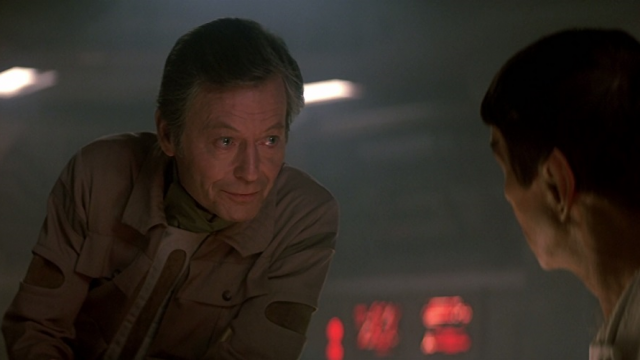Honestly, I always liked him best. My sister was all about Spock, but given my druthers, I’d go for McCoy every time. One of the only Star Trek novels I still own and read from my Trekkie youth is The Romulan Way, wherein McCoy is practically the only Enterprise crewmember to appear for the majority of the book. His intelligence was, I feel, underrated, since he couldn’t compete with Spock. But he was smart and funny and compassionate, and he was a good doctor. He wasn’t as flashy as Kirk, and he wasn’t as distinctive as Spock, but no. I always liked McCoy best.
Though in fact he kind of fell into the role from not wanting to be typecast, alas. He did a lot of Westerns before then; he even has the Golden Cowboy Boot award. Possibly it’s the accent—one of these days, I am going to get around to writing a discussion of the use of Confederate veterans in Westerns and what it says about our culture. But he did a lot of the standard ’50s Western shows. He did three different versions of the OK Corral story, if you include the episode of Star Trek it’s in. He even said he liked Westerns better than science fiction, in part because it got you into the fresh air, which not all acting did. I wouldn’t be surprised to know that all those Star Trek episodes are not the first nor the last time he was out at Vasquez Rocks.
He is, on the other hand, said to have said on his deathbed that he wanted to go make another Star Trek movie, because those were a lot of fun. What’s more, he liked being an inspiration. He had wanted to be a doctor, it seems, and could not afford it. It gave him pleasure to the end of his days to know that he’d inspired as many people as he had to become doctors. He couldn’t do it himself, but he helped others, and that counted for something at least. He was very proud of that.
That, I suppose, is a primary difference between sci-fi and Westerns. While our culture is permeated with our obsession with Westerns, I feel as though our relationship with sci-fi is more aspirational. I suppose some people watch Westerns and become lawmen or soldiers, but I feel as though we get a lot more stories of people who watch sci-fi and become scientists, astronauts, engineers—and, yes, doctors. I grant you that there’s a strong connection between how we as a culture use science fiction and how we use Westerns—Gene’s famous “Wagon Train to the stars,” after all. But I suppose it’s the difference of past and future.
Think, indeed, about the scene from Star Trek IV, in my opinion the best Star Trek movie, in the hospital. McCoy cannot see the woman suffering without alleviating it; that’s in his nature. He can give her a pill to cure her, so he does. He sees the medicine of the modern age as a bare step above barbarism, but instead of just condemning it, he gives some of his superior medicine to someone. He can’t save everyone, but he saves someone. And then, of course, goes on to risk his life to save the entire Earth, because that’s science fiction for you. No wonder he thought those movies were so much fun.
Help me afford a copy of The One With The Whales; consider supporting my Patreon!

